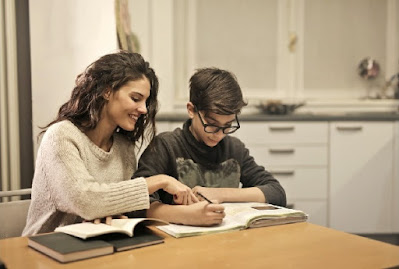LINKING VERBS
Verbs in this special category link or join the subject with its complement. The subject never performs the action, and the verb never takes a direct object. Adjectives, not adverbs, follow these verbs. The following verbs belong to this special group.
[Appear, feel, look, seem, be, get, prove, smell, become, grow, remain, sound]
‘Feel’, ‘look’, ‘get’, ‘prove’, ‘smell’, ‘grow’ and ‘sound’ can be transitive verbs.
Keep in mind that the verbs ‘be’, ‘become’, and ‘remain’ can also be followed by noun phrases.
Compare this noun phrase with the adjective.
- John is president of the sophomore class. (noun phrase)
- Tony was excited about winning the prize. (adjective)
- Christa MacAuliffe became one of the first women in space. (noun phrase)
- Teddy became tired after playing several long tennis matches. (adjective)
- Mr. Frazer will remain senator until the end of this term. (noun)
- The students remained seated while the school president distributed the diplomas. (adjective)
Look at the following sentences to distinguish their use as transitive or intransitive verbs.
- Notice how the subject performs the action in the sentences that contain adverbs and direct objects.
- You will feel the effects of the medicine in a short while. (takes a direct object)
- Jason felt uncomfortable in his three-piece suit. (adjective)
- The hikers cautiously felt their way along the dark mountain trail. (adverb)
- Nancy grew a variety of vegetables in her garden this summer. (takes a direct object)
- The weather grew cold as the front passed over the area. (adj.)
- Marcella looks very attractive with her new hairdo. (adj.)
- The little boy looked carefully before crossing the street. (adv.)
- The food in the kitchen smells good. (adj.)
- The customer insisted on smelling the cologne before purchasing it. (takes a direct object)
- Your plan sounds excellent. (adj.)
- Tim sounded the alarm when the fire broke out. (takes a direct object)
- The hot chocolate tasted good on such a cold night. (adj.)
- The cook tasted the sauce before pouring it on the vegetables. (takes a direct object)
- The mother hurriedly tasted the food to be sure that it would not burn the baby’s tongue. (adv.)
- The weather turned hot and muggy. (adj.)
- We had to turn the key before opening the door. (takes a direct object)
- Jill got an A on her last test. (takes a direct object)
- We got tired of waiting for the bus and decided to walk. (adj.)
- The district attorney proved his point by displaying the evidence. (takes a direct object)
- The experiment could prove fatal if you don’t take the proper precautions. (adj.)
- Keep in mind that when you are modifying an adjective, you need to use the adverb form.
In the following sentences, although you have one of the linking verbs, you are really modifying the adjective, not the verb.
- We felt unusually strong after taking the medicine. (adv. adj.)
- Despite her many problems, Nell seemed unbelievably happy. (adv. adj.)
USING ADJECTIVES WITH LINKING VERBS
When the above-mentioned linking verbs are intransitive, then the adjective form, not the adverb form, follows the verb. There is no action involved, and the adjective modifies the subject, not the verb.
- We felt happy after receiving the good news.
- Anita grew tired of listening to the same music all day.
- No one seemed pleased by the new director’s remarks.
- Peter sounded excited when we told him of our plans for the trip.
In the following sentences, underline the verbs and tell whether they are transitive or intransitive.
1. His cat watched the birds in the trees.
2. My brother will not buy a new car until next summer.
3. The hunter killed a tiger.
4. Ranjita tripped on the top step and fell downstairs.
5. He ordered a hamburger and a milkshake for me.
6. Have you ever explored a cave?
7. A young boy discovered a huge cave in Kentucky.
8. Rohit has a very intriguing job.
9. They arrived at the stadium 15 minutes before the game started.
10. Do you play tennis every day?
11. The Prime Minister assembled his cabinet after the election.
12. Mr. Thapa spoke for more than an hour about the deficit in our finances.
13. Our was surrounded by many tall trees.
14. The house on the hill belongs to the Millers.
15. She has four children in elementary school.
16. You should not walk in the rain without your boots.
17. The failure of the experiment discouraged Charles.
18. The boy showed us a picture of his entire family.
19. His sister has perfected several new techniques for medical research.
20. Why did you take my umbrella?
21. Beethoven composed many great pieces of music.
22. How many famous paintings does he possess?
23. Tom likes neither coffee nor tea.
24. My uncle has lived in Paris for many years.
25. Many of the buildings in Paris are very old and beautiful.
26. John’s plans for the new house were incomplete.
27. Mrs. Shakya stopped at the filling station for some gas.



.png)


0 Comments